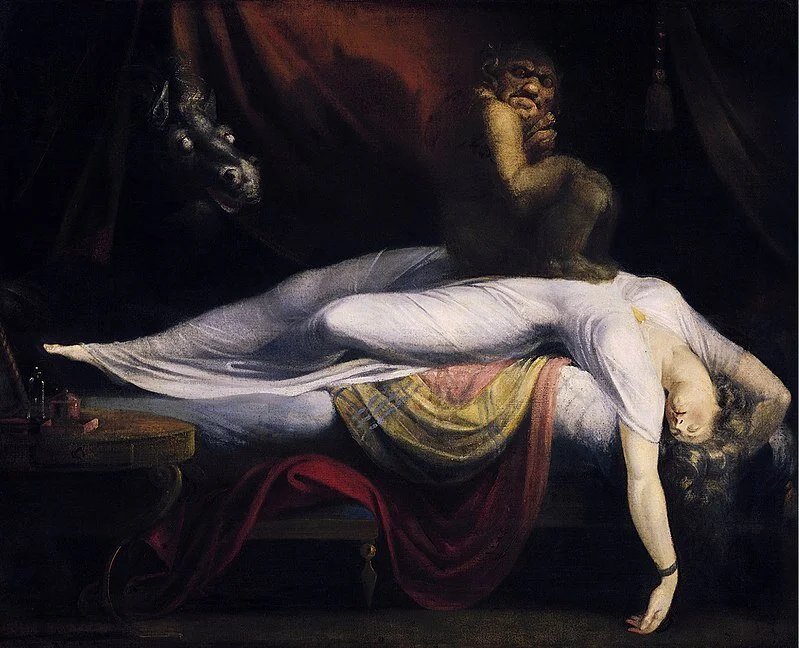Cover Image: Norman Lewis, “Ritual” (1962)
Voices from the African diaspora have always been a part of speculative fiction’s history. Before Amazing Stories defined science fiction as a proper genre, W.E.B. Du Bois used “The Comet” to imagine a post-racial apocalypse; just last year, N.K. Jemisin made history as the first author to win three consecutive Hugos for her Broken Earth trilogy. Jemisin, Octavia Butler and Samuel R. Delany rightly get a lot of love in posts like these, but the breadth of black voices in science fiction and fantasy goes well beyond these best known names. In honor of Black History Month, we’re celebrating five speculative short stories from black authors—classic trailblazers, living legends, and fresh up-and-comers—that get us excited. If you haven’t yet picked up their work, here’s another chance to get to know them!
Lisa Recommends: Charles W. Chesnutt
In 1887, The Atlantic Monthly published Charles Chesnutt’s first short story, “The Goophered Grapevines,” which was also the first story it published by a self-identified African-American writer. In “The Goophered Grapevines,” an Ohio vintner looking to buy a former grape plantation in North Carolina finds a former slave, Uncle Julius, eating a mountain of delicious grapes. He warns them the owner hired a conjure-woman to goopher (hex) the vines to sicken slaves who were “stealing” his grapes. Julius’s accent is rendered in thick dialect, which is a slog, but the story is clever. The Yankee is not frightened off, but Chesnutt never clarifies if Julius’s story is true, told for sheer fun, or designed to scare the Yankees away from Julius’ valuable crop.
The Southern Gothic elements are bountiful as the grapes. There’s the decaying plantation, unsustained by slave labor and overgrown with grapevines in broken-down arbors. There’s the slave-owning family that faded, childless, into obscurity, and Northern capital forcing economic change upon post-war South. There’s the skilled, hard-working former slave skittish because of his history with cruel whites, and a witch to boot. The story is full of ambivalence around the narrator and Julius’s interactions, but Chesnutt’s indignation at racial injustice is powerful. The story can be read on a couple of levels, which reflects Chesnutt’s own mission. In his time, he could socially and legally “pass” as white, but he chose to openly identify (and write) as a black man. In his diary, he wrote (age 22):
I think I must write a book. . . . The object of my writing would not be so much the elevation of the colored people as the elevation of the whites—for I consider the unjust spirit of caste which is so insidious as to pervade a whole nation, and so powerful as to subject a whole race and all connected with it to scorn and social ostracism—I consider this a barrier to the moral progress of the American people: and I would be one of the first to head a determined, organized crusade against it.
Unfortunately, Chesnutt’s words still ring true in our decade, and his determined crusade is as necessary as ever.
Danyelle Recommends: Nisi Shawl
At the start of Nisi Shawl’s “The Pragmatical Princess” (1999), originally published in Asimov’s Science Fiction, Princess Ousmani has been fed to a dragon. I am a huge sucker for any story that turns the damsel in distress trope on its head, and this one does a nice job of that. Our princess is very practical about her circumstances, questioning, at first, if dragons are even real. She is quite sure they aren’t, but when one shows up to where she has been chained down as a sacrificial lamb in service to her father’s upsettingly grand ambitions, she has to think fast.
Nisi Shawl (via Aqueduct Press)
Ousmani’s outlook and voice are full of pragmatism as she assesses her shifting situation throughout the story, from the dragon’s initial lack of interest in eating her to the solution she comes to in the story’s conclusion. Because this is a short story, I don’t want to spoil anything. Let’s just say a rational assessment leads Ousmani to labor to save the dragon, her new friend. The tale is short and sweet, the exact kind of thing one reads to get a good sample of an author’s abilities. What I found was a lovely work of fantasy that leaves me wanting more.
Nisi Shawl has been writing and anthologizing speculative fiction for three decades, and she’ll be honored at this year’s Nebulas for her “distinguished contributions to the science fiction and fantasy community.” Now, excuse me, while I go to the list of Shawl’s online works and devour everything I can get my hands on.
Amanda Recommends: Rivers Solomon
Rivers Solomon (via Akashic Books)
I knew I’d be a Rivers Solomon fan the moment I saw their short story “St. Juju” described as “Love in a Time of Trash-Eating Mushrooms.” If a short story involves fungus, I’m in. Online science fiction magazine The Verge published “St. Juju” as part of their Better Worlds project, which features stories, animated adaptations, and audio adaptations by diverse authors “who take a more optimistic view of what lies ahead in ways both large and small, fantastical and everyday.”
In “St. Juju,” fields of mushrooms grow over trash heaps, digesting and re-terraforming the landfills. The mushrooms are then consumed by the people who occupy the Milkwood enclave. While most humans can still only eat the things that feed on and grow off of the trash, a genetic mutation enables some humans to crave and digest garbage directly. These humans are called hound-mutants, because of their bloodhound-like ability to sniff out trash and other “food,” even from deep underground.
Less than a generation prior, hound-mutants were forced into labor for their landfill-clearing abilities, while simultaneously shunned for their appetites. The stink of old-world prejudice is still present as Juju and her lover, Enid, walk across the mushroom fields where “the scent of the old-world trash lingers.” Even in the distant future, same-gender relationships are still scorned as “sin incarnate,” and Juju must present an argument—an oration—to the enclave’s leaders about why her relationship with Enid should be accepted. Juju considers the saints of old religions: those who traded what was expected of them for what was truly sacred. Solomon pushes Juju and the reader into deep consideration of symbiotic and toxic relationships: trash that feeds mushrooms that feed humans who create trash; love that feeds humanity that scorns love; humans who both need and abuse each other.
This is a story about hope, though, even when the shadows of prejudice, trauma, and abuse lurk beneath the surface: “Bigotry is taught, I know that, but I wish it weren’t so easily learned.”
Ted Recommends: Cadwell Turnbull
Many of Cadwell Turnbull’s stories take place on St. Thomas (part of the U.S. Virgin Islands), where Turnbull grew up, and they showcase his keen eye for the local story within the global. St. Thomas may not be a world power, but it’s a witness to some of the most momentous stories on Earth: from its legacy of slavery, colonialism, and imperialism, to its position on the front lines of hurricanes supercharged by climate change. Likewise, in Turnbull’s stories, his commitment to personal, intimate stories on the ostensible periphery proves effective witness to global dramas.
Cadwell Turnbull (via author site)
If you need to start with something short, check out “Loneliness Is In Your Blood,” which was anthologized in Best American Science Fiction & Fantasy 2018. Told by a succouyant, a sort of vampire out of Caribbean folklore, “Loneliness” will give you a taste of Turnbull’s clean, lyrical prose, confident craft, and deep compassion. But my favorite (so far) is “A Third of the Stars in Heaven,” which tells an enormous story of alien occupation, faith, doubt, and nanotechnology, all in the course of a proper St. Thomian lady visiting her doctor. Henrietta is a captivating and complex heroine, a church woman who sees her clinician and thinks, “Lips that red were hardly appropriate for a doctor.” Turnbull draws her with the astonishing richness, concision, subtlety and humor of a prolific literary stylist.
“A Third of the Stars in Heaven” is part of a larger cycle of stories set in an alien-colonized Virgin Islands, and it looks like his forthcoming novel, The Lesson (Blackstone Publishing, June 2019), is too. He’s also in the Better Worlds series, with a fantastic audio story of a collectively owned A.I. and hurricane relief. You’ll want to start reading Turnbull if you haven’t already.
CH Lips Recommends: Phenderson Djèli Clark
If our blog had an emoji option I’d put a banner of clapping hands around the title of this story. When I read “The Nine Negro Teeth of George Washington,” my mind said: Wait, what? I thought GW had wooden teeth!
Clark’s story falls under alternate history, but the story opens with an actual entry from one of Washington’s account books on display at Mount Vernon: “By Cash pd Negroes for 9 Teeth on Acct of Dr. Lemoire” –Lund Washington, Mount Vernon plantation, Account Book dated 1784.” In this way, Clark puts forth his premise right at the start—there is another story behind the story we’ve been told—an alternate history to the history.
He has a book out, too! (via author site)
In fact we get nine alternate histories—the lives of the nine owners of the teeth purchased by George Washington. The story presents almost as a work of journalism—there is no obvious narrator, the details of the nine lives read like facts in an article. The fantastical elements sneak in, as if they were normal, factual elements of the world. In the second story a man (the owner of the second tooth) is on a slave ship bound for Barbados. In the middle of the paragraph it’s casually mentioned that he’s “…chained beside a merman, with scales that sparkled like green jewels and eyes round as black coins.” Clark presents these fantastical elements as if to say—the rules have been broken; history is not what we were told; Washington wore the teeth of slaves, and there were mermen on slave ships. [And in a horrific way, there were - ed.]
This is a perfect story to read during February, when we celebrate both Black History Month and Washington’s birthday. In his blog post, “Tips for Understanding Black History Month,” Clark addresses the question: “I’m not Black, why is Black History Month important?”
Because. That’s my answer. It’s important just because. You think you understand the American Revolution? You don’t if you have never heard of Crispus Attucks, the paradox of his martyrdom and why he was whitewashed out of history. You don’t understand it at all if you don’t know about Lord Dunmore’s Proclamation and the role black people, both slave and free, played within–and why it’s even mentioned in the Declaration of Independence.
That’s the thing. Black History doesn’t exist suspended in the air somewhere hovering about outside of the broader historical narrative. It’s not a set of trivia questions. Black people did not sit on the sidelines as spectators while history occurred. Black people were part of that history. They influenced it. They played roles. They were actors and agents. You don’t understand Black folk history, then you don’t understand history–period. Particularly the history of the United States.
(Bonus!) Jon Recommends: Victor LaValle
Technically, Jon’s off being brilliant in Munich, but be sure to check out his moving 2016 essay on Victor LaValle’s The Ballad of Black Tom, which “subversively reimagines a story by a virulent racist and installs a powerful black man as its protagonist.”
















There is so much out there to read, and until you get your turn in a time loop, you don’t have time to read it all to find the highlights.